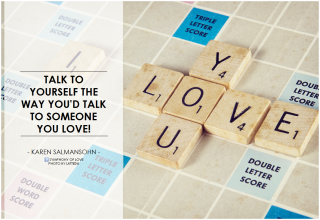Relationships
To Love Someone, Do You Really Need to Love Yourself First?
Conventional wisdom about love and relationships can be more myth than reality.
Posted August 11, 2015 Reviewed by Jessica Schrader

It’s become commonplace to proclaim that truly loving another depends on first loving yourself. But just how warranted is this maxim? Is it supported by science or academic research? Or is it little more than folk wisdom—or maybe, pseudo-wisdom? I’ve sought to track down any authoritative studies on this so-intriguing topic . . . and come up with nothing.
I could be wrong here, but it’s always felt to me like one of those aphorisms that’s accepted as valid primarily because it sounds valid. And the truism does exude a tone of wise, loving self-compassion. It seems completely reasonable that we can’t really know love until we experience it from within—for ourselves. But might this all somehow be begging the question?
Given my professional role as a psychologist for the past 30+ years, I’ve come, empirically, to a rather different conclusion about self-love. To me, it’s extremely unlikely that without the ability to love oneself a person can ever be happy. That is, what’s necessary and sufficient—not for loving another but for a state of inner contentment and well-being—is healthy self-love and acceptance. For it only makes sense that if you’re not on very good terms with yourself, you’re not going to be happy with life generally.
I can recall working with several multi-millionaires, who were plainly miserable. So there’s nothing intrinsic about wealth (and all the amenities it can buy) that guarantees happiness. Nor, for that matter, can the most gratifying relationships—even though you might be loved, or even adored, by an admiring (and admirable) partner. For, ultimately, your happiness depends on being happy with yourself.
Almost all of us have heard of people who, allegedly, “have it all” but who, nonetheless, end up committing suicide. Despite their outward success, they feel their whole life is an act, a charade, that essentially they’re frauds—and that one day they’ll be “found out” and shunned as the impostors they really are. Basically, they hold themselves in contempt, harboring a profoundly negative sense of self that clearly overrides their so-impressive life “vita.”
In virtually all these cases, such individuals’ upbringings were marked by non-loving parental abuse or neglect. And regrettably, these experiences left them with grave doubts about their attractiveness, competence, or basic human worth. Never having availed themselves of the opportunity to undergo longer-term therapy (likely because they didn’t think they could be helped), they couldn’t internalize their later-day accomplishments. And so their negative, outdated beliefs about themselves continued to undermine, even nullify, the many positive things they’d achieved since childhood.
Moreover—and sharply contrary to the familiar adage that constitutes the subject of this post—these same individuals may have been unquestionably loving both toward their spouses and children. So it’s hard to find compelling evidence that would confirm the notion that the inner love of self is a prerequisite for loving anyone outside the self. For, personally, I’ve seen many individuals quite capable of caring deeply for others, yet who struggled mightily to extend this same caring toward themselves. They’d regularly reveal profound misgivings about who, deep down, they believed they were.

So, forget about loving anyone else. In the end, if your core sense of self is painfully disturbed or deficient, you won’t be able to love yourself. But here it should be added that psychotherapy has many effective ways of rectifying an impoverished self-regard—though, granted, it’s always a challenge to transform something so deeply embedded in a person’s self-image. Treatment, therefore, rarely responds to any brief, “band-aid” type of therapy.
Still, if one commits oneself to addressing the source(s) of one’s so-frustrating self-dislike, over time profound change can, and does, occur. The final goal here is unconditional self-acceptance. And that—in my professional experience—is almost indistinguishable from self-love.
Yet one last question remains: Would learning how to truly love yourself enable you to love another more? No simple answer suggests itself here because your growing self-love might be seen as independent of your ability to love someone else. But if, warts and all, you come to fully embrace yourself, your relationships would definitely become more intimate. For then you’d no longer feel compelled to hide your supposedly "unacceptable" qualities. You’d be more able to open yourself up to others, and you’d probably want to do so. Plus, such a heightened willingness to self-disclose can be infectious, prompting others to respond in kind and so deepen feelings of love and attachment between both of you.
Having resolved old feelings of anxiety, shame, inferiority, and unlovability, you’d no longer fear being “unmasked”—and thereby repudiated. You’d finally feel comfortable in your own skin, confident about letting others know who you are. And so your lifelong potential for a deeper, more confiding—and consequently, more loving—relationship might at last be realized.
To conclude, if you’ve pretty much taken on faith the presumably self-evident veracity of the need-to-love-yourself-first adage, might it be time to reevaluate what by now has become so hackneyed—though it may not be, or have ever been, true? For you might want to consider replacing it with something like: “To deepen your love and acceptance of another, first develop love and acceptance for yourself.” Admittedly, such a revision isn't nearly as catchy as the “love yourself first” dictum. But perhaps it’s more descriptive of how we as humans operate in the world.
If you could relate to this post and think others might, too, please consider passing on its link. If you’d like to check out other posts I’ve done for Psychology Today online—on a broad variety of psychological topics—please click here. To be notified whenever I post something new, I invite readers to join me on Facebook and Twitter.
© 2015 Leon F. Seltzer, Ph.D. All Rights Reserved.




